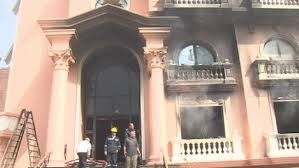By Paul Nicholson
March 11 – Violence erupted in Egypt again over the weekend and the Egyptian FA headquarters were burned down after fans rioted after the second court ruling following the Port Said disaster in February 2012 handed down sentences to a further 54 people and confirmed the 21 death sentences already passed last month.
Meanwhile, the Egyptian league, which only restarted last month after being suspended for a year following the Port Said deaths, continued its programme this weekend after the minister of the interior and the Egyptian FA both emphasised that football should continue, though still behind closed stadium doors.
While the politics of revolution and football have become inextricably linked in Egypt, the decision to play on is widely regarded as the right decision by football insiders.
“The stakeholders are all in agreement of refusing any violence and that burning down the police officers’ club and the headquarters of the Egyptian FA was not the best way to protest. But this was a reaction of anger. And it is difficult to confirm that this was the work of the Al-Ahly Ultras only or not. There are other militant forces that could be involved ,” said an Egyptian football insider.
“For us it is important that football continues, the league has to play on. The judge took a hard line and we must look at this. Two police officers received 15 years. Compare this to the sniper that was shooting out the eyes of protestors during the revolution. He was only given three years. Most of the police Officers who committed violent acts against protestors during and after the revolution were not convicted and were freed by Court. This gives you an indication that it was a fair trial without any political influence and one has to accept it and move on.
“Any other claims should be followed through in the right channels of justice.”
It is believed that it is the resumption of football that will bring healing, though that will be a very long process, not surprisingly.
“The Al-Ahly board has already taken the decision that they will not play in Port Said for five years. We expect this decision to be honoured by all associations (clubs),” said one source.
“At the moment matches can be watched on television. For the African Champions League and World Cup Qualifiers crowds will start to be allowed back into stadiums on a small but increasing basis.”
The Al-Ahly Ultras whose compatriots had been killed in the Port Said rioting, had previously warned that they would retaliate if any of the accused were exonerated. It is now felt that there is a growing recognition within the Ultras that there is nothing further to be done and although harsher penalties were desired
Broadcast live on television, the judge’s verdicts were initially met with cheers by the Al_Ahly fans in Cairo as the 21 death sentences already handed down were confirmed.
But the mood turned sour as the judge then handed down life sentences to five people, with 19 receiving various lesser jail terms and another 28, including seven policemen, exonerated. It was the decision to convict just two of the nine police officers that sparked most indignation – many believed that at least four police officers should have been sentenced.
Port Said governorate security chief Essam Eddin Samak was one of those sentenced to 15 years in jail, as was Brig. Gen. Mohammed Saad who was in charge of the gates at the Port Said stadium.
In the clashes that followed the judge’s ruling two people were killed, one by gunshot and one by suffocation after inhaling teargas.
Contact the writer of this story at moc.l1745124107labto1745124107ofdlr1745124107owedi1745124107sni@n1745124107osloh1745124107cin.l1745124107uap1745124107

